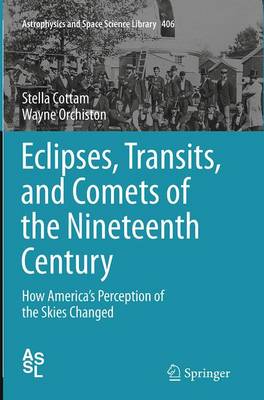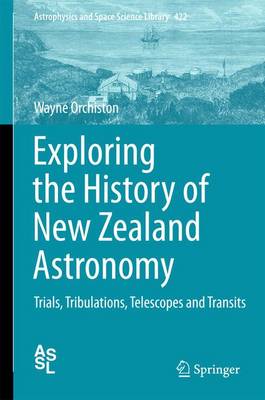Astrophysics and Space Science Library
2 primary works
Book 406
Eclipses, Transits, and Comets of the Nineteenth Century
by Stella Cottam and Wayne Orchiston
Grabbing the attention of poets, politicians and the general public alike, a series of spectacular astronomical events in the late 1800s galvanized Americans to take a greater interest in astronomy than ever before. At a time when the sciences were not yet as well established in the United States as they were in Europe, this public interest and support provided the growing scientific community in the United States with the platform they needed to advance the field of astronomy in the United States. Earlier in the 19th century comets, meteors and the discovery of the planet Neptune were all sources of inspiration to the general public. The specific events to be considered here are the total solar eclipses of 1868, 1869 and 1878 and the transits of Venus of 1874 and 1882. The available media responded to public interest as well as generating more interest. These events laidthe groundwork that led to today's thriving network of American amateur astronomers and provide a fascinating look at earlier conceptions of the stars.
Book 422
Dr. Orchiston is a foremost authority on the subject of New Zealand astronomy, and here are the collected papers of his fruitful studies in this area, including both those published many years ago and new material. The papers herein review traditional Maori astronomy, examine the appearance of nautical astronomy practiced by Cook and his astronomers on their various stopovers in New Zealand during their three voyagers to the South Seas, and also explore notable nineteenth century New Zealand observatories historically, from significant telescopes now located in New Zealand to local and international observations made during the 1874 and 1882 transits of Venus and the nineteenth and twentieth century preoccupation of New Zealand amateur astronomers with comets and meteors.
New Zealand astronomy has a truly rich history, extending from the Maori civilization in pre-European times through to the years when explorers and navigators discovered the region, up to pioneering research on the newly emerging field of radio astronomy during WWII and in the immediate post-war years. A complete survey of a neglected but rich national astronomical history, this does the subject full and comprehensive justice.

